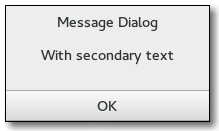Gtk.MessageDialog - Classes - Gtk 3.0 (original) (raw)
g Atk.ImplementorIface Atk.ImplementorIface Gtk.Widget Gtk.Widget Atk.ImplementorIface->Gtk.Widget GObject.GInterface GObject.GInterface GObject.GInterface->Atk.ImplementorIface Gtk.Buildable Gtk.Buildable GObject.GInterface->Gtk.Buildable GObject.InitiallyUnowned GObject.InitiallyUnowned GObject.InitiallyUnowned->Gtk.Widget GObject.Object GObject.Object GObject.Object->GObject.InitiallyUnowned Gtk.Bin Gtk.Bin Gtk.Window Gtk.Window Gtk.Bin->Gtk.Window Gtk.Buildable->Gtk.Widget Gtk.Container Gtk.Container Gtk.Container->Gtk.Bin Gtk.Dialog Gtk.Dialog Gtk.MessageDialog Gtk.MessageDialog Gtk.Dialog->Gtk.MessageDialog Gtk.Widget->Gtk.Container Gtk.Window->Gtk.Dialog
Example¶

Subclasses:
None
Methods¶
Inherited:
Gtk.Dialog (14), Gtk.Window (119), Gtk.Bin (1), Gtk.Container (35), Gtk.Widget (278), GObject.Object (37), Gtk.Buildable (10)
Structs:
Gtk.ContainerClass (5), Gtk.WidgetClass (12), GObject.ObjectClass (5)
| format_secondary_markup (message_format) |
|---|
| format_secondary_text (message_format) |
| get_image () |
| get_message_area () |
| set_image (image) |
| set_markup (str) |
Virtual Methods¶
Inherited:
Gtk.Dialog (2), Gtk.Window (5), Gtk.Container (10), Gtk.Widget (82), GObject.Object (7), Gtk.Buildable (10)
Properties¶
Inherited:
Gtk.Dialog (1), Gtk.Window (33), Gtk.Container (3), Gtk.Widget (39)
| Name | Type | Flags | Short Description |
|---|---|---|---|
| buttons | Gtk.ButtonsType | w/co | The buttons shown in the message dialog |
| image | Gtk.Widget | d/r/w | The image deprecated |
| message-area | Gtk.Widget | r | Gtk.Box that holds the dialog’s primary and secondary labels |
| message-type | Gtk.MessageType | r/w/c/en | The type of message |
| secondary-text | str | r/w | The secondary text of the message dialog |
| secondary-use-markup | bool | r/w/en | The secondary text includes Pango markup. |
| text | str | r/w | The primary text of the message dialog |
| use-markup | bool | r/w/en | The primary text of the title includes Pango markup. |
Style Properties¶
Inherited:
Gtk.Dialog (4), Gtk.Window (2), Gtk.Widget (17)
| Name | Type | Default | Flags | Short Description |
|---|---|---|---|---|
| message-border | int | 12 | r | Width of border around the label in the message dialog |
Signals¶
Inherited:
Gtk.Dialog (2), Gtk.Window (5), Gtk.Container (4), Gtk.Widget (69), GObject.Object (1)
Fields¶
Inherited:
Gtk.Dialog (2), Gtk.Window (5), Gtk.Container (4), Gtk.Widget (69), GObject.Object (1)
| Name | Type | Access | Description |
|---|---|---|---|
| parent_instance | Gtk.Dialog | r |
Class Details¶
class Gtk.MessageDialog(*args, **kwargs)¶
Bases:
Abstract:
No
Structure:
Gtk.MessageDialog presents a dialog with some message text. It’s simply a convenience widget; you could construct the equivalent of Gtk.MessageDialogfrom Gtk.Dialog without too much effort, but Gtk.MessageDialog saves typing.
One difference from Gtk.Dialog is that Gtk.MessageDialog sets theGtk.Window :skip-taskbar-hint property to True, so that the dialog is hidden from the taskbar by default.
The easiest way to do a modal message dialog is to use Gtk.Dialog.run(), though you can also pass in the Gtk.DialogFlags.MODAL flag, Gtk.Dialog.run() automatically makes the dialog modal and waits for the user to respond to it. Gtk.Dialog.run() returns when any dialog button is clicked.
An example for using a modal dialog:
GtkDialogFlags flags = GTK_DIALOG_DESTROY_WITH_PARENT; dialog = gtk_message_dialog_new (parent_window, flags, GTK_MESSAGE_ERROR, GTK_BUTTONS_CLOSE, "Error reading “%s”: %s", filename, g_strerror (errno)); gtk_dialog_run (GTK_DIALOG (dialog)); gtk_widget_destroy (dialog);
You might do a non-modal Gtk.MessageDialog as follows:
An example for a non-modal dialog:
GtkDialogFlags flags = GTK_DIALOG_DESTROY_WITH_PARENT; dialog = gtk_message_dialog_new (parent_window, flags, GTK_MESSAGE_ERROR, GTK_BUTTONS_CLOSE, "Error reading “%s”: %s", filename, g_strerror (errno));
// Destroy the dialog when the user responds to it // (e.g. clicks a button)
g_signal_connect_swapped (dialog, "response", G_CALLBACK (gtk_widget_destroy), dialog);
Gtk.MessageDialog as Gtk.Buildable
The Gtk.MessageDialog implementation of the Gtk.Buildable interface exposes the message area as an internal child with the name “message_area”.
format_secondary_markup(message_format)[source]¶
The type of the None singleton.
New in version 2.6.
format_secondary_text(message_format)[source]¶
The type of the None singleton.
New in version 2.6.
Returns:
the dialog’s image
Return type:
Gets the dialog’s image.
New in version 2.14.
Deprecated since version 3.12: Use Gtk.Dialog for dialogs with images
Returns:
A Gtk.Box corresponding to the “message area” in the self.
Return type:
Returns the message area of the dialog. This is the box where the dialog’s primary and secondary labels are packed. You can add your own extra content to that box and it will appear below those labels. See Gtk.Dialog.get_content_area() for the corresponding function in the parent Gtk.Dialog.
New in version 2.22.
Parameters:
image (Gtk.Widget) – the image
Sets the dialog’s image to image.
New in version 2.10.
Deprecated since version 3.12: Use Gtk.Dialog to create dialogs with images
Parameters:
str (str) – markup string (see Pango markup format)
Sets the text of the message dialog to be str, which is marked up with the Pango text markup language.
New in version 2.4.
Property Details¶
Gtk.MessageDialog.props.buttons¶
Name:
buttons
Type:
Default Value:
Flags:
The buttons shown in the message dialog
Gtk.MessageDialog.props.image¶
Name:
image
Type:
Default Value:
Flags:
DEPRECATED, READABLE, WRITABLE
The image for this dialog.
New in version 2.10.
Deprecated since version 3.12: Use Gtk.Dialog to create dialogs with images
Gtk.MessageDialog.props.message_area¶
Name:
message-area
Type:
Default Value:
Flags:
The Gtk.Box that corresponds to the message area of this dialog. SeeGtk.MessageDialog.get_message_area() for a detailed description of this area.
New in version 2.22.
Gtk.MessageDialog.props.message_type¶
Name:
message-type
Type:
Default Value:
Flags:
READABLE, WRITABLE, CONSTRUCT, EXPLICIT_NOTIFY
The type of the message.
Gtk.MessageDialog.props.secondary_text¶
Name:
secondary-text
Type:
Default Value:
Flags:
The secondary text of the message dialog.
New in version 2.10.
Gtk.MessageDialog.props.secondary_use_markup¶
Name:
secondary-use-markup
Type:
Default Value:
Flags:
READABLE, WRITABLE, EXPLICIT_NOTIFY
True if the secondary text of the dialog includes Pango markup. See Pango.parse_markup().
New in version 2.10.
Gtk.MessageDialog.props.text¶
Name:
text
Type:
Default Value:
''
Flags:
The primary text of the message dialog. If the dialog has a secondary text, this will appear as the title.
New in version 2.10.
Gtk.MessageDialog.props.use_markup¶
Name:
use-markup
Type:
Default Value:
Flags:
READABLE, WRITABLE, EXPLICIT_NOTIFY
True if the primary text of the dialog includes Pango markup. See Pango.parse_markup().
New in version 2.10.